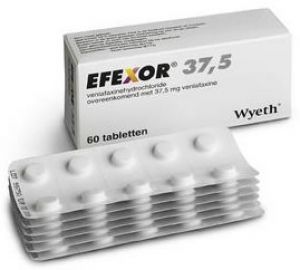Top Class Actions’s website and social media posts use affiliate links. If you make a purchase using such links, we may receive a commission, but it will not result in any additional charges to you. Please review our Affiliate Link Disclosure for more information.

The U.S. Food and Drug Administration (FDA) approved Effexor for these uses in 1993. However, allegations have since emerged that the drug’s maker, Wyeth Pharmaceuticals (a subsidiary of Pfizer), marketed Effexor as safe for pregnant women despite knowledge of increased risks for certain birth defects.
Effexor has been successfully used in treating patients, but there have been many reports of very serious side effects including birth defects. It has been noted that Effexor causes heart and lung birth defects in newborns. Research now indicates that women using SSNRIs in the first 12 weeks of pregnancy have a 40 percent greater risk of their baby suffering birth defects. Heart defects are 60 percent more likely, according to research.
Is Taking Effexor During Pregnancy Safe?
The FDA has established a pregnancy drug category system to classify the potential risks to an unborn child when a certain drug is taken during pregnancy. The FDA has named Effexor a Pregnancy Category C drug, meaning that it could potentially harm a fetus, particularly when used during the third trimester. By placing Effexor into Category C, the FDA is warning that while the drug has not been tested in humans, animal studies have shown that it presents a risk to a fetus.
Pregnancy C category drugs, like Effexor, can still be administered during pregnancy if the doctor believes that its potential benefits outweigh its risks to the child. The label advises women to tell their doctors if they become pregnant or intend on becoming pregnant during treatment.
In 2004, the label for Effexor was updated to advise patients that infants who were exposed to the drug during the third trimester had developed complications which warranted tube feeding, prolonged hospitalization and respiratory support. According to the FDA, these complications developed immediately after birth.
As a result of allegedly inadequate warnings provided to consumers and the medical community many women have been given the popular antidepressant while pregnant, which may have unknowingly exposed their unborn child to an increased risk of severe and dangerous birth defects, including:
- Abdominal birth defects
- Anal atresia
- Heart defects
- Craniosynostosis
- Pulmonary stenosis
- Limb defects
- Genital defects
Effexor Birth Defect Litigation
The U.S. Judicial Panel on Multidistrict Litigation (JPML) has consolidated all federal Effexor lawsuits claiming Effexor caused birth defects into one lawsuit (In Re: Effexor (Venlafaxine Hydrochloride) Product Liability Litigation — MDL No. 2458).
In MDLs, the legal system combines evidence and testimony from very similar lawsuits to streamline the legal system when large numbers of similar birth defect lawsuits have been filed. Lawsuits within the MDL allege that antidepressants like Effexor have been linked to several types of birth defects, including heart, skull, and lung birth defects. This includes cleft lip/cleft palate, heart birth defects, and PPHN.
The nine federal Effexor lawsuits that were initially part of the MDL all claim that, while pregnant, a woman took Effexor and eventually gave birth to a child with birth defects. There are another 10 Effexor lawsuits that are waiting to be added to the Effexor MDL. Another 36 similar Effexor lawsuits are pending in other courts across the country.
Do YOU have a legal claim? Fill out the form on this page now for a free, immediate, and confidential case evaluation. The birth defect attorneys who work with Top Class Actions will contact you if you qualify to let you know if an individual lawsuit or class action lawsuit is best for you. [In general, birth defect lawsuits are filed individually by each plaintiff and are not class actions.] Hurry — statutes of limitations may apply.
ATTORNEY ADVERTISING
Top Class Actions is a Proud Member of the American Bar Association
LEGAL INFORMATION IS NOT LEGAL ADVICE
Top Class Actions Legal Statement
©2008 – 2024 Top Class Actions® LLC
Various Trademarks held by their respective owners
This website is not intended for viewing or usage by European Union citizens.
Get Help – It’s Free
Join a Free Birth Defect Lawsuit Investigation
If you or a loved one took Zoloft, Prozac, Lexapro, Effexor, Celexa, Cymbalta or Depakote during pregnancy and gave birth to a child with a congenital defect, you may have a legal claim against the drug’s manufacturer. Find out if you qualify to pursue compensation for your child’s medical expenses, pain and suffering, and other damages by filling out the form below now.
An attorney will contact you if you qualify to discuss the details of your potential case.
Oops! We could not locate your form.












